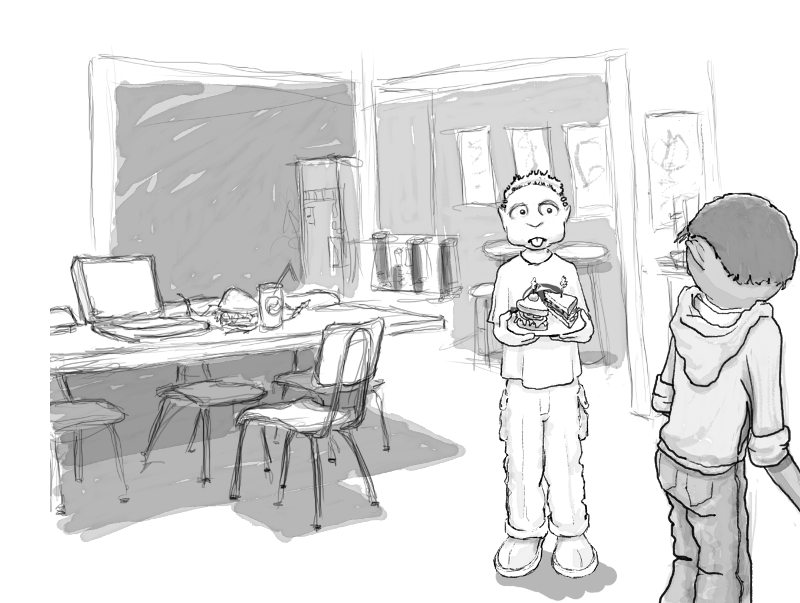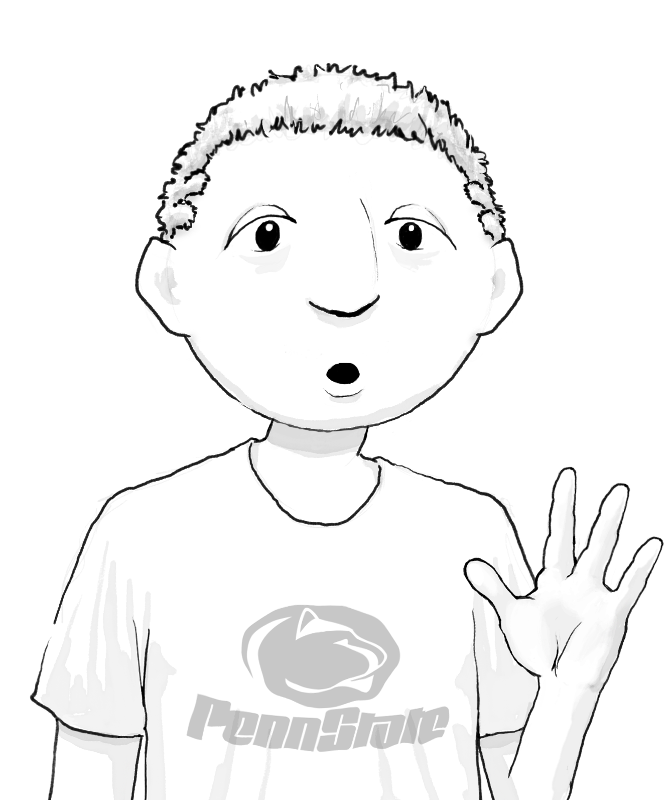iStudy for Success!
Online learning tutorials for essential college skills.
Test Anxiety
Purpose
 Almost everyone experiences some level of nervousness or tension before tests or other important events in his or her life. The term "test anxiety" refers to the emotional, physical, and cognitive reactions that some students have to exams. The fear of exams is not an irrational fear - after all, how you perform on college exams can shape the course of your academic career.
Almost everyone experiences some level of nervousness or tension before tests or other important events in his or her life. The term "test anxiety" refers to the emotional, physical, and cognitive reactions that some students have to exams. The fear of exams is not an irrational fear - after all, how you perform on college exams can shape the course of your academic career.
Some students experience physical symptoms of anxiety before and during exams (an upset stomach, sweaty palms, etc.). Many of these students have trouble recalling information that they actually know and become so nervous about preparing for or taking a test that they have difficulty planning, thinking, concentrating, and relaxing. A little nervousness can actually help motivate us; however, excessive fear of exams is a problem when it interferes with your ability to be successful in college.
This tutorial suggests ways of managing your anxiety, as well as suggestions and tips applicable to anyone who takes exams. This tutorial will help you understand what test anxiety is, when it is a normal reaction, and ways to cope with it.
Goals and Objectives
Upon completion of this tutorial, you will be able to:
- Determine if you have excessive or irrational anxiety about taking tests
- Identify two causes of test anxiety
- List three signs that you aren't well prepared for a test
- Plan a semester-long, test-taking strategy to cope with test anxiety and improve test scores
- Explain the role good health habits play in doing well on tests
- Identify three things you could do to improve your eating and exercise habits
- Use relaxation techniques to cope with test anxiety
Activities
- Activity 1: Take a survey to check if you are test anxious
- Read information about different causes of test anxiety
- Read student dialog about what to do with test anxiety
- Cope with test anxiety: Preparation
- Complete Activity 2: Preparation before an exam
- Cope with test anxiety: On exam day
- Complete Activity 3: Strategies for taking an exam
- Read information about self care
- Read information about relaxation
Note: All external links in this tutorial will open in a new window or tab.
References
Summary
Instructor's Guide
Activity 1: Are You "Test Anxious?"
Take a survey on Your Level of Test Anxiety to see if you are test anxious. (Opens in a new window or tab.)
Causes of Test Anxiety
 Anxiety is created by expectations or thoughts about what is likely to happen. If you think negative things to yourself about your abilities, you produce a corresponding negative emotional reaction: anxiety. If you believe you are not smart, you don't know the information well enough, or you aren't capable of performing well on exams, then your expectations will be for failure. Negative expectations then create anxiety, and anxiety can disable you from actually doing well. Therefore, if you believe in yourself and your abilities and have positive expectations for how you will perform on the exam, you will be better able to cope with the anxiety (a small amount of anxiety can be helpful for performing well.).
Anxiety is created by expectations or thoughts about what is likely to happen. If you think negative things to yourself about your abilities, you produce a corresponding negative emotional reaction: anxiety. If you believe you are not smart, you don't know the information well enough, or you aren't capable of performing well on exams, then your expectations will be for failure. Negative expectations then create anxiety, and anxiety can disable you from actually doing well. Therefore, if you believe in yourself and your abilities and have positive expectations for how you will perform on the exam, you will be better able to cope with the anxiety (a small amount of anxiety can be helpful for performing well.).
Students may blame poor exam performance on test anxiety. This poor performance may actually be a lack of preparedness for a test (which causes anxiety), rather than classic test anxiety. Be well prepared. If your anxiety is a direct result of lack of preparation, consider anxiety a normal, rational reaction. Lack of preparation is indicated by the following:
- Cramming the night before the exam
- Failure to organize course information
- Worrying about past performance on exams and how friends and other students are doing in comparison to yourself
However, if you are adequately prepared but still panic, "blank out," and/or overreact, your reaction is not rational. In either case, it is helpful to know how to overcome the effects of test anxiety.
What Can You Do about Test Anxiety?
Student Dialog - What to Do about Test Anxiety?

Brian: I've got a test next week and I'm scared!
Jose: Why are you scared? Haven't you studied for it?
Brian: Of course I've studied, especially during the last few days. The test is in English, the course I failed last semester. Last night I couldn't even sleep.
Jose: Brian, it sounds like you're scared because you failed the course last semester and so you think you're going to fail it again this semester.
Brian: Yeah, I guess that's it . . .
Jose: A lot of students suffer from test anxiety at some point. I know some things you can do that might help. Would you like to work on them?
 Brian: That'd be great!
Brian: That'd be great!
Jose: When I get anxious about a test, I try to figure out why I'm worried. For me, feeling like I'm prepared is the key. If I don't feel prepared, then I get worried.
Brian: But I've been studying, and I'm still worried.
Jose: Tell me about how and when you've been studying for this exam.
Brian: Well, I started making study notes a couple of weeks ago. Once I finished compiling them, I started studying . . . probably last week.
Jose: So...you really started studying for your final about 3 weeks in advance?
Brian: Yeah, I guess so. But I did take notes in class and read before class.
Jose: Lack of preparation is one of the main causes of text anxiety. It's not enough to study, you need to develop good study habits, too.
Brian: I see. So you're saying I need a study strategy.

Jose: Exactly! And you need to make sure you are managing and organizing your time! Make sure you stick to whatever schedule you create.
Brian: Ok, I'm understanding this now. So my study strategy should include scheduling time for studying. What else should I do to avoid feeling anxious at test time?
Jose: Well, you've got to take care of yourself, too. Sometimes I get so busy, I forget to eat. It's important to eat right, get enough sleep, and take a break for yourself! When I get anxious, I practice some relaxation techniques.
Brian: Really? Like what?
Jose: Like breathing slowly and deeply for a few minutes. This helps me calm down and clear my head.
Brian: That sounds like a good one, Jose. I'll give it a try. One technique I use is to keep "negative" thoughts about the test out of my head. I tell myself I'm going to pass the test and if I don't pass this one, I'll do better next time. Sounds silly I know, but it works for me.
Jose: I like that one, Brian.
Cope with Test Anxiety: Preparation
You can control test anxiety so that your performance on a test reflects your real standing in that course. However, if levels of test anxiety that interfere with your academic success persist, talk to a counselor for some specialized help.
Mental preparation is a primary concern when dealing with test anxiety. Be well prepared for the test.
At the beginning of the semester:
- Plan your study strategy so that you will know the material well enough at exam time that you can recall it even when you are under stress.
- Organize your time (see the iStudy tutorial on time management) and stick closely to your schedule. When you are scheduled to study, study. Learn and practice good time management and avoid laziness, procrastination, and daydreaming.
Form a study group where you can review notes, reading assignments, and homework with a few classmates (see the iStudy tutorial on cooperative learning for tips on forming a study group).
During the semester, pay attention to your attitude:
- Build confidence by studying throughout the semester and avoid cramming the night before the exam. A final review is fine, but trying to cover two months of material in two hours is not an effective way to prepare for an exam.
- Learn to concentrate on the material you are studying.
- Generate questions from your textbooks and lecture notes.
- Focus on key words, concepts, and examples in your textbooks and lecture notes.
- Make charts and outlines which organize the information in your notes and textbooks.
- Review texts, notes, and homework problems.
- Make your study setting conducive to studying and free from distractions.
- Engage in "thought stopping" if you find that you are worrying a lot, mentally comparing yourself to your peers, or thinking about what others may say about your performance in a course.
- Practice anxiety control strategies. As you study, deliberately induce anxiety by saying to yourself the negative thoughts you typically have during an exam (i.e., "I'm going to fail.") Remind yourself that you will probably experience some anxiety during tests, but the anxiety won't hamper your performance because you've practiced controlling it.
- Allow time for recreation and study breaks. When you schedule fun and relaxation, enjoy.
- Maintain a regular exercise program.
[top of page]
Several days before the exam:
- Spreading review over several days rather than cramming it in will aid memory development and retention and will reduce last-minute anxiety.
- Several days before the exam, discuss the test content with your instructor and study group or classmates.
- Combine all the information that has been presented to you in preparation for the exam and work on mastering the main concepts.
- If you are unable to review all the material the exam will cover, select important portions that you can absorb well.
- Set a goal of presenting your knowledge of this information on the test.
- When studying for the exam, test yourself with questions that may be asked and try to answer them by integrating ideas from lectures, notes, texts, and supplementary readings.
- If possible, take a practice test under exam-like conditions.
- Remind yourself that your entire future doesn't depend on this exam. There will be other exams and other courses. Many students fail a course or two but go on to graduate from Penn State and have successful careers.
- Don't give a test the power to define you. An exam won't tell you whether you're brilliant or stupid. Your performance on an exam mostly depends on how well you studied for the test, the quality of your prior education, and the test-taking strategies you use.
- As you anticipate the exam, think positively (e.g., "I can do okay on this exam. I've studied and I know my stuff."). Remember that the most reasonable expectation is to try to show as much of what you know as you can.
- Remind yourself of past successes. Think of a tough course in which you struggled but eventually succeeded. Tell yourself that if you did well on that past exam, you can do well on the upcoming exam.
[top of page]
The night before the exam:
- Visualize completing the test successfully despite your anxiety. Play the entire "tape" in your mind - from the moment you wake up on the day of the exam to the moment you finish the exam.
- Before you go to bed on the night before the exam, make sure to collect anything that you will need for the exam - pen, pencil, ruler, eraser, calculator, etc.
- Set the alarm clock and then get a good night's sleep. Don't go without sleep the night before an exam.
Activity 2: Quiz on Preparation Before an Exam
Check to see if you remember what you just read by taking the quiz below.

Cope with Test Anxiety: On Exam Day

The day of the exam:
- Begin your day with a moderate breakfast and avoid coffee if you are prone to "caffeine jitters." Even people who usually manage caffeine well may feel light-headed and jittery when indulging on the day of a test.
- Double-check the time and location of the exam. Get to the exam on time - not too late but not too early. Getting to class TOO early may cause anxiety. Relax, and don't talk about the test with friends; frantic reviews are often more confusing than helpful.
- Stop studying an hour or so before the test and relax and compose yourself.
- If waiting for the test to begin causes anxiety, distract yourself by reading a magazine or newspaper.
When you arrive at the location of the exam and begin the exam:
- Bring everything you will need with you (scratch paper, pencils, calculator, etc.) so you won't be frantically trying to borrow things.
- Sit in a location in the exam room where you will be distracted as little as possible, where there is good lighting, and where you feel comfortable. Avoid positioning yourself near doors or other high-distraction areas.
- As the exams are distributed, calm yourself down by taking some slow, deep breaths. Some initial tension is normal. Remind yourself of how hard you studied, how well you did on another exam, and how you've practiced anxiety control.
- When you receive the test, stop for a moment, take a few deep breaths and exhale slowly, relax, and then start reviewing the directions and test items.
- Make sure to carefully read any instructions on the exam.
- Don't hesitate to ask for clarification from the professor, teaching assistant, or proctor if you have questions about the directions or procedure, rather than letting anxiety build up because you aren't sure about what you are expected to do.
- Budget your test-taking time. Read over the test and plan your approach. Ascertain point values per part, time limits for each section, which question you'll start with, etc.
- In a timed test, make a schedule for answering questions. Allow more time for higher-point questions. Pace yourself to answer as many questions as possible.
- Develop an aggressive, yet realistic attitude. Approach the test vigorously, determined that you will do your best, but also accept the limits of what you know at the moment. Use everything you know to do well, but don't blame yourself for what you don't know.
- Calm yourself by saying a couple of sentences like: "This test will not permanently affect my life. I'm going to feel calm and relaxed."
[top of page]
During the exam:
- Pay attention to the test, not to yourself or others. Don't waste time worrying, doubting yourself, wondering how other people are doing, or blaming yourself. Don't worry about what you should have done; pay attention to what you can do now.
- Direct your focus to the questions. Try to link questions to their corresponding lecture and/or chapter.
- Don't spend too much time on any one question. If you can't come up with the answer quickly, move on to questions you can answer. This will get your mental processes and concentration ready for more difficult questions. You can always come back if you have time. Higher scores will usually result from trying all the items.
- If you're taking an essay test and you go blank and can't think of anything to write, go on to another question or another part of the test. Pick a question and start writing. Jot down anything you can recall on scratch paper to stimulate your memory and get your mind working. It may trigger the answer in your mind.
- If the exam is more difficult than you anticipated, try to focus and just do your best. It might be enough to get you through, even with a reasonable grade!
- Do not obsess about running out of time on the test. Check the time periodically (say, after you've finished a third of the test), but avoid checking too frequently, as this will only distract you and make you more anxious. Remind yourself that it's better to miss a few points by not quite finishing the test than to lose your concentration and thus miss many points.
- Practice visualizing a calm, soothing scene (such as a beach or mountains) and use this when you feel anxious.
- If you notice that you are not thinking well, you are worrying excessively about one problem, you are not reading carefully, you are forgetting information you know, or your muscles are tight, try this anxiety control procedure:
-Turn the test paper over and close your eyes.
-Change positions to help you relax. Stretch your arms and legs and then relax them again. Tense and relax muscles in several parts of your body, then take several deep breaths with your eyes still closed. Breathe in slowly to the count of seven and exhale to the count of seven. Concentrate on your breathing.
-If possible, do something different for a few seconds. For example: get a drink, sharpen a pencil, eat a snack, ask a question.
-Turn the test paper right side up, and give yourself a positive self pep talk (i.e., "You're sure to do well. You studied hard and remember, you got an A on that final in physics.") This whole procedure should take only about a minute to do. It's well worth the time!
- Think of the test as a game. Your goal is to collect as many points as you can in the time available. Don't worry about a particular question. If you're unsure of the answer, guess and move on. Remind yourself that you can miss a few questions and still get an A.
- Don't panic when students start handing in their papers. There's no reward for being the first one done.
[top of page]
After the Exam:
- When the exam is over, reward yourself.
- If you don't have any other commitments, maybe you can go to a movie, go out to eat, or visit with friends.
- If you have to study for other exams, you may have to postpone a larger break, but a brief break can be the pickup that you need.
Activity 3: Quiz on Strategies for Taking An Exam
Time for another quick review by completing the quiz below.

Self Care
 In addition to developing good study habits and techniques, it's important to remember that good nutrition, exercise, some personal "down time," a reasonable amount of social interaction, and adequate rest are also important parts of any study program, especially before an exam. When people are tired and run down, they become frustrated more easily and experience more anxiety.
In addition to developing good study habits and techniques, it's important to remember that good nutrition, exercise, some personal "down time," a reasonable amount of social interaction, and adequate rest are also important parts of any study program, especially before an exam. When people are tired and run down, they become frustrated more easily and experience more anxiety.
Students preparing for tests often neglect basic biological, emotional, and social needs. To do your best, you must attend to these needs. Think of yourself as a total person, not just a test taker. Remember to:
- Establish habits of good nutrition and exercise, as well as recreational pursuits and social activities. All of these contribute to your emotional and physical well-being.
- Follow a moderate pace when studying; vary your work when possible and take breaks when needed.
- Get plenty of sleep the night before the test — when you are overly tired you will not function at your absolute best.
- Avoid alcohol and other drugs. Self-medicating with alcohol and drugs can increase anxiety and interfere with your ability to do your best.
Relaxation

Relaxation techniques are another way you can reduce anxiety. When used with mental and physical preparation, relaxation before and during an exam can aid retention and improve test performance. Here are several techniques for you to try:
Technique 1
- Breathe in slowly and deeply through your nose and feel your stomach (not your chest) extend. Hold for a few seconds. Pull in your stomach, forcing the air out and think "relax." Repeat two or three times. Practice this procedure.
- Next, to let your body relax, put your arms at your sides, close your eyes, and let your mind go blank.
- Now, beginning with your head, tense the muscles in your forehead and scalp for about ten seconds. Then let them relax completely. Think about how the difference between the two states feels and concentrate on making those muscles relax more and more.
- After about thirty seconds, repeat the process with the muscles of your face and jaw, neck, shoulders, arms, chest, and all the way down your body until you reach your toes.
- While continuing to relax, imagine those situations in which you feel most tense and anxious. If you become anxious, stop imagining and relax again. Repeat the process of relaxation and imagining until you no longer feel anxiety while imagining the situations.
- Practice relaxing at times when you feel anxious - while studying, reviewing, or actually taking the exam (if time permits). This will reduce tension and help you to clear your mind.
Technique 2
It is possible for students to learn how to relax on cue, so that anxiety can be controlled during the exam. Learning how to relax is fairly simple, but if you want to be able to do so during your next exam, you will have to practice it beforehand. Follow these steps:
- Get comfortable in your chair - slouch down if that helps.
- Tighten, then relax different muscle groups of your body, one group at a time. Start with your feet, then move up your body to your neck and face.
- Breathe slowly and deeply.
- Focus your attention on your breath going in and out.
- Each time you breathe out say, "relax," to yourself.
Technique 3
Another approach focuses on reducing negative and worrisome thoughts that provoke the anxiety. Students who are anxious about tests tend to think things to themselves that are negative or exaggerated. Research shows that test anxiety can be reduced if these negative thoughts can be replaced by constructive thoughts. In order to do this, you must first become aware of your own thoughts, and then replace them with constructive thoughts. For example, replace a thought such as "If I do badly on the test, I'm a failure" with a thought such as "Yes, this is a difficult test. I am going to do the best I can. If I get a low grade, I will do what it takes to perform better next time."
References
Content
- Academic Center For Excellence, University of Illinois at Chicago. (2004). "Test Anxiety." Retrieved August 26, 2004 from http://www.uic.edu/depts/counselctr/ace/testanxiety.htm *
- Brigham Young University, Academic Success Center. (2017). "Test-taking Strategies." Retrieved July 10, 2017 from https://casc.byu.edu/testtaking-strategies
- Hampden-Sydney College. (2004). "Test Anxiety." Retrieved from http://www.hsc.edu/counseling/selfhelp/test_anxiety.html *
- Student Development Center Western SDC. (2017). "Managing Test Anxiety." Retrieved July 10, 2017 from https://www.uwo.ca/sdc/learning/selfhelp/skill_building_handouts/
- University of Illinois at Urbana-Champaign. (1996). "Test Anxiety." Retrieved July 10, 2017 from https://counselingcenter.illinois.edu/brochures/test-anxiety
- University of Missouri-Rolla. (2017). "Test Anxiety." Retrieved July 10, 2017 from http://counsel.mst.edu/selfhelp/vpl/testanxiety/
- The University of Texas at Austin, The UT Learning Center. (2002). "How to Keep Calm During Tests." Retrieved August 26, 2004 from http://www.utexas.edu/student/utlc/handouts/1305.html *
- University of Texas at Dallas. (2017). "Test Anxiety." Retrieved July 10, 2017, from https://www.utdallas.edu/counseling/testanxiety/
* Indicates that the original Website is no longer available.
Image Credits
Anxious Man
- Source: http://commons.wikimedia.org/wiki/
- File: Anxiety.gif
- This file is licensed under the Creative Commons Attribution-Share Alike 3.0 Unported license.
Anxious Girl
- Source: http://commons.wikimedia.org/wiki/
- File: Girl_suffering_form_anxiety.JPG
- This file is licensed under the Creative Commons Attribution-Share Alike 3.0 Unported license.
Screaming Man
- Source: http://www.flickr.com/photos/pshmell/6168981134/sizes/l/in/photostream
- This file is licensed under the Attribution-NonCommercial-ShareAlike 2.0 Generic (CC BY-NC-SA 2.0).
Salad
- Source: http://www.flickr.com/photos/deedoucette/5083911594/sizes/z/in/photostream
- This file is licensed under the Attribution-NonCommercial-ShareAlike 2.0 Generic (CC BY-NC-SA 2.0).
Sleeping Puppy
- Source: http://www.flickr.com/photos/fcaballero/5556281
- This file is licensed under the Attribution-NonCommercial-NoDerivs 2.0 Generic (CC BY-NC-ND 2.0).
Summary
Some anxiety over taking tests is very common - it is a normal reaction to a stressful situation. Anxiety becomes a problem when it interferes with your ability to recall information that you really do know and causes you to become so nervous that you have trouble thinking clearly.
There are a number of things you can do to combat test anxiety, including managing your time well and developing good study habits so you are well prepared for each test, quiz, and exam. There are also several relaxation techniques you can practice that can help you cope with stressful, anxiety producing situations. If you feel that your anxiety level is above normal and nothing you try seems to help, be sure to get professional help from your advisor or a counselor - these people are trained to help you with problems that are more than you can manage on your own.
Instructor's Guide
Quizzes and Activities
The following are the assignments embedded in the Test Anxiety tutorial:
- Activity 1: Test Anxiety Survey
- Activity 2: Quiz on Preparation Before an Exam
- Activity 3: Quiz on Strategies for Taking an Exam
Relationship to Other iStudy Tutorials
This tutorial is related to the iStudy tutorials on personal effectiveness, including note-taking, active reading, active listening, and stress management.
Therefore, it is recommended that instructors introduce this tutorial to students in conjunction with other personal effectiveness tutorials.
Suggested In-class Methods of Presentation
Begin by introducing the tutorial and having students complete the test anxiety survey to determine their personal levels of anxiety. Some students might find that they have a very low level of test anxiety, however, strategies described in this tutorial for studying, relaxing, and staying focused will benefit all students, regardless of their anxiety level.
After reviewing the goals and objectives for the tutorial, students should read the information and complete the activities. In-class discussions would give students opportunities to apply the tips and suggestions to their personal situations. Small group discussions also work well for this topic.
Key Points
Instructors may want to emphasize the total recommended study time that students should spend on class work:
On average you should spend 2-3 hours outside of class for every hour in class. This means you would spend 45 hours per week on your classes if you had a 15-credit semester. In addition to class work, you most likely have other demands on your time, such as a part-time job, family responsibilities, extra-curricular activities, and so on. A common cause of test anxiety is not scheduling or making enough time to study.
Common symptoms of lack of preparation include:
- Cramming the night before the exam
- Failure to organize course information
- Worrying about past performance on exams and how friends and other students are doing in comparison to yourself
There are three areas students should focus on to combat test anxiety:
Other important areas on which to focus are attitude, when and how to study for an exam, and strategies for the day of the exam and taking the exam.
Assessment
Through observing group and/or individual activities, the instructor may assess student performance. Assessment criteria are as follows (instructors supply the percentage weights):
Assessment Criteria
|
Where
|
Domain
|
Activities
|
%
|
|
iStudy Tutorial
|
Knowledge
|
The student can identify common mistakes and pitfalls when preparing for an exam.
|
|
|
iStudy Tutorial
|
Comprehension
|
The student can determine goals for reducing anxiety and obtaining satisfactory performance on exams.
|
|
|
In-Class
|
Application
|
The student can develop a semester-long test-taking strategy for coping with test anxiety and improving scores.
|
|
|
iStudy Tutorial
|
Analysis
|
The student can determine if their level of anxiety has been reduced by following the plan they created.
|
100%
|
 Almost everyone experiences some level of nervousness or tension before tests or other important events in his or her life. The term "test anxiety" refers to the emotional, physical, and cognitive reactions that some students have to exams. The fear of exams is not an irrational fear - after all, how you perform on college exams can shape the course of your academic career.
Almost everyone experiences some level of nervousness or tension before tests or other important events in his or her life. The term "test anxiety" refers to the emotional, physical, and cognitive reactions that some students have to exams. The fear of exams is not an irrational fear - after all, how you perform on college exams can shape the course of your academic career.
 Brian: That'd be great!
Brian: That'd be great!


 In addition to developing good study habits and techniques, it's important to remember that good nutrition, exercise, some personal "down time," a reasonable amount of social interaction, and adequate rest are also important parts of any study program, especially before an exam. When people are tired and run down, they become frustrated more easily and experience more anxiety.
In addition to developing good study habits and techniques, it's important to remember that good nutrition, exercise, some personal "down time," a reasonable amount of social interaction, and adequate rest are also important parts of any study program, especially before an exam. When people are tired and run down, they become frustrated more easily and experience more anxiety.